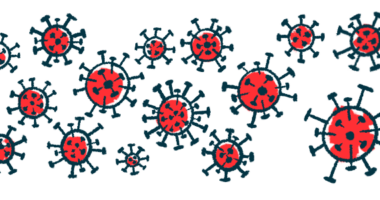Mutation type seen to influence global gene activity in CF cell study
Findings may explain some of the wide variability in patient outcomes

Unique global changes in gene activity and protein production were linked to different types of mutations in the CFTR gene, the underlying cause of cystic fibrosis (CF), a cell-based study has revealed.
These changes were most likely due to the cell’s attempt to cope with global gene activity changes caused by each mutation type rather than a response to actual defects in the CFTR protein, data show.
These findings may also help explain, in part, some of the wide variability in clinical outcomes in patients living with CF and suggest “mutation-specific alterations in cellular pathways that may be of therapeutic interest,” researchers noted.
The study, “Mutation-class dependent signatures outweigh disease-associated processes in cystic fibrosis cells,” was published in the journal Cell & Bioscience.
More than 2,100 CFTR gene mutations have been identified
The CFTR gene carries instructions to make CFTR protein, which acts like a gate in cell membranes, regulating the flow of chloride ions and water in and out of cells.
People with CF carry mutations in the CFTR gene resulting in a defective CFTR protein, which alters chloride flow and water balance, resulting in the build-up of thick and sticky mucus, particularly in the lungs and digestive system.
So far, more than 2,100 CFTR gene mutations have been identified, which are categorized into seven classes according to their effect on the CFTR protein. For example, the most common CF-causing mutation is known as F508del, falling into class 2, whereby CFTR mutations lead to CFTR protein misfolding and degradation, preventing it from reaching the cell membrane.
Other CFTR mutation classes are based on impaired CFTR protein production, protein instability, or inability to regulate chloride and water flow.
However, the diversity of CFTR mutations does not wholly explain the wide variability in clinical outcomes in CF patients, suggesting that disease-related genetic defects may also impact other genes and proteins in cells.
These results suggest that most changes detected at the [gene activity] level are more likely to be a consequence of the cell’s attempt to cope with changes in gene expression induced by each type of mutation than to represent a response to the actual loss-of-function of the CFTR [protein].
Gene-editing tool CRISPR used in study
To find out, researchers based at the University of Lisbon, in Portugal, led a study that analyzed global patterns of gene activity and protein production associated with different primary classes of CFTR mutations.
The gene-editing tool CRISPR was used to introduce these mutations in human bronchial epithelial cells, those that line the airways. This included the mutation G542X (class 1, faulty protein production), F508del and N1303K (class 2), G551D (class 3, impaired gate), and I1234V (class 5, low protein levels).
Various techniques were applied to detect differentially expressed genes (DEGs) and proteins (DEPs), meaning global changes in gene activity and protein production caused by each mutation type compared to unaffected control cells.
Gene activity analysis found the number of DEGs for each CFTR mutation ranged from 416 in the I1234V mutant to 1304 in the N1303K mutant. The two class 2 mutations (F508del and N1303K) were markedly different from the other classes, with twice the number of DEGs than other CFTR mutations and sharing the highest proportion of DEGs — 73% with F508del and 65% with N1303K.
In comparison, all other mutations shared up to 30% of DEGs, of which about one-third (38 DEGs) were found across all gene mutation classes. There was also a considerable number of unique DEGs, ranging between 137 (G551D) and 329 (N1303K).
“Taken together, these results suggest that most changes detected at the [gene activity] level are more likely to be a consequence of the cell’s attempt to cope with changes in gene expression induced by each type of mutation than to represent a response to the actual loss-of-function of the CFTR [protein],” the researchers wrote.
Protein production analysis detected 340 DEPs on average, ranging from 282 to 443. The number of DEPs and DEGs was within a similar range, except for class 2 mutations with more than 1000 DEGs, the researchers noted. They found 36 of the 443 DEPs were common across all cell lines.
In addition, about 70% of DEPs from the N1303K mutation were in common with F508del, which was more than 40% higher than proteins shared with any of the other three mutations.
Combining gene activity and protein production data showed about 810 (97.3%) of the protein changes matched gene activity changes, which the researchers called “detected translated-transcripts” (Dtt). Correlation analysis found that 60% of the variability in protein levels was explained by the variability in gene activity.
‘Global changes observed correlate with the mutation class,’ researchers say
The team noted that differential expression was predominantly identified at the protein level, suggesting that changes in protein production affected by CFTR mutations are primarily due to regulatory processes occurring after proteins are made.
In contrast, class 2 mutations (F508del and N1303K) showed the highest number of linked gene-protein Dtts that were regulated at the genetic level. No Dtt was common to all mutations.
Regarding the Dtts shared by two or more cell lines, the biggest overlap occurred between F508del and N1303K — with 15 common Dtts, of which 13 were exclusive of this pair.
“This observation further supports the hypothesis that the global changes observed correlate with the mutation class,” the team wrote.
“The present study provides a global picture of the genes and proteins that are differentially expressed in human bronchial cells as a result of prototypical CFTR mutations,” the scientists wrote.
“Our work provides important new insights that extend beyond the molecular pathology of CF and CFTR [loss-of-function] to the global quest for the identification of molecular targets for genetic disorders using [gene activity] and [protein production] approaches,” they added.









